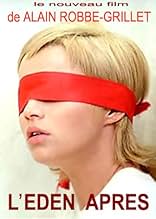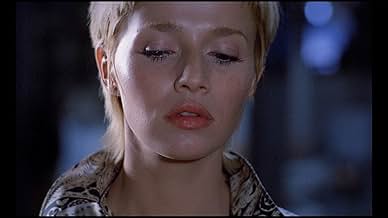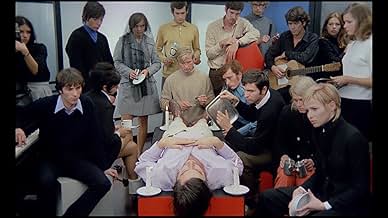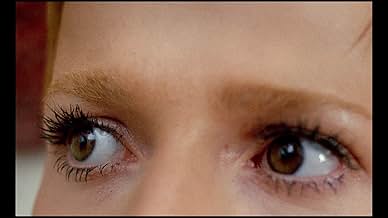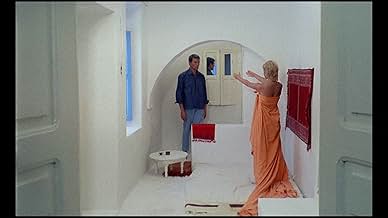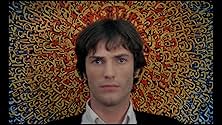CALIFICACIÓN DE IMDb
6.4/10
1.5 k
TU CALIFICACIÓN
Un grupo de estudiantes franceses se ven envueltos en los juegos psicológicos y sexuales de un misterioso holandés. Una vez que prueban su "polvo de miedo", los estudiantes experimentan una ... Leer todoUn grupo de estudiantes franceses se ven envueltos en los juegos psicológicos y sexuales de un misterioso holandés. Una vez que prueban su "polvo de miedo", los estudiantes experimentan una serie de alucinaciones.Un grupo de estudiantes franceses se ven envueltos en los juegos psicológicos y sexuales de un misterioso holandés. Una vez que prueban su "polvo de miedo", los estudiantes experimentan una serie de alucinaciones.
- Dirección
- Guionista
- Elenco
- Premios
- 1 nominación en total
Jarmila Kolenicová
- Sonia
- (as Jarmila Kolenicova)
Ludovít Króner
- Franc
- (as Ludwik Kroner)
Eva Luther
- Violette's look-a-like
- (sin créditos)
- Dirección
- Guionista
- Todo el elenco y el equipo
- Producción, taquilla y más en IMDbPro
Opiniones destacadas
This film isn't as good as it could've been but it still has a lot of merit and is worth seeing. There is some extremely memorable and disturbing imagery that got under my skin. A lot of these scenes and images were very effective and a lot of them are still stuck in my mind long after watching the film.
The films presentation as a whole is very solid. With some great sound design, beautiful technicolor cinematography and usage of its Tunisian setting. My main issue with this film is that it didn't really have a point overall and the story itself wasn't compelling enough to make up for that. For example with the film Last Year at Marienbad (also scripted by Alain Robbe Grillet) it has a lot of thematic depth and tonnes going on underneath the surface. Which is helped significantly by the hypnotic atmosphere. Eden and After doesn't really have that.
There's not a lot to take away from it and the atmosphere/story isn't particularly compelling. Which does make the film a bit of a slog at points despite the relatively short runtime. The films disturbing sexual imagery, sound design and surreal scenes do help the film a lot. Though I wished those elements were used for a much more compelling, thought provoking and disturbing film overall.
Eden and After is still a really interesting movie with a lot of great things going for it. Though unfortunately it's rather underwhelming which prevents me from calling it one of the great psychedelic/surreal films of the period. If all of the positive elements of this movie were used for a better film. I think this movie could've easily have been on par with Salo, Climax and The Devils which do a lot of what this movie is going for more successfully.
The films presentation as a whole is very solid. With some great sound design, beautiful technicolor cinematography and usage of its Tunisian setting. My main issue with this film is that it didn't really have a point overall and the story itself wasn't compelling enough to make up for that. For example with the film Last Year at Marienbad (also scripted by Alain Robbe Grillet) it has a lot of thematic depth and tonnes going on underneath the surface. Which is helped significantly by the hypnotic atmosphere. Eden and After doesn't really have that.
There's not a lot to take away from it and the atmosphere/story isn't particularly compelling. Which does make the film a bit of a slog at points despite the relatively short runtime. The films disturbing sexual imagery, sound design and surreal scenes do help the film a lot. Though I wished those elements were used for a much more compelling, thought provoking and disturbing film overall.
Eden and After is still a really interesting movie with a lot of great things going for it. Though unfortunately it's rather underwhelming which prevents me from calling it one of the great psychedelic/surreal films of the period. If all of the positive elements of this movie were used for a better film. I think this movie could've easily have been on par with Salo, Climax and The Devils which do a lot of what this movie is going for more successfully.
I knew of novelist Alain Robbe-Grillet chiefly by virtue of his script for Alain Resnais’ art-house masterpiece LAST YEAR IN MARIENBAD (1961; which I intend to revisit in tribute to the author). Eventually, I became aware of his own films as a director via a thread on “The Latarnia Forums” – which, back then, had intrigued me a great deal and, in fact, was highly pleased to acquire three of them a few months ago. Unfortunately, the prints were incredibly murky – so I kind of lost my enthusiasm and it’s only now, in honor of his passing, that I made a concentrated effort to stick with them!
However, my first encounter with these titles proved a disappointment: as I said, the picture quality left a lot to be desired – but, frankly, so did the film itself! Judging by the celebrated Resnais work, I knew I’d be in for an oblique and possibly multi-layered piece – however, to be honest, I found it made little sense and that it was generally weird for weirdness’ sake! In fact, if I had to compare Robbe-Grillet’s style here with that of contemporaneous film-makers, I’d say this is Godard meets Antonioni meets Jodorowsky!; that, in itself, would sound like a most interesting proposition to some…but, I assure you, the film is a bit of a bore despite plenty of nudity (the writer-director seems to have a thing for sadomasochism, as can also be seen from TRANS-EUROP-EXPRESS [1966]) and a stunning-looking heroine in Catherine Jourdan (sporting cropped blonde hair).
The plot, such as it is, has to do with a group of disaffected students who are shown a way out of their ennui (via a concoction he offers) by a man they meet at a café (the Eden of the title); Jourdan is supposed to have a night-time tryst with him at a factory but, on arriving for the appointment, she is intimidated by some of her fellow students and finds the man dead! Taking a clue from a postcard of an Arabian town found in the stranger’s pocket, Jourdan gets mixed-up in espionage (the MacGuffin in this case being a valuable missing portrait), games of a sexual nature, drug-induced hallucinations and murder; eventually, we come full circle and the story returns to the Eden and the arrival once again of the stranger...
However, my first encounter with these titles proved a disappointment: as I said, the picture quality left a lot to be desired – but, frankly, so did the film itself! Judging by the celebrated Resnais work, I knew I’d be in for an oblique and possibly multi-layered piece – however, to be honest, I found it made little sense and that it was generally weird for weirdness’ sake! In fact, if I had to compare Robbe-Grillet’s style here with that of contemporaneous film-makers, I’d say this is Godard meets Antonioni meets Jodorowsky!; that, in itself, would sound like a most interesting proposition to some…but, I assure you, the film is a bit of a bore despite plenty of nudity (the writer-director seems to have a thing for sadomasochism, as can also be seen from TRANS-EUROP-EXPRESS [1966]) and a stunning-looking heroine in Catherine Jourdan (sporting cropped blonde hair).
The plot, such as it is, has to do with a group of disaffected students who are shown a way out of their ennui (via a concoction he offers) by a man they meet at a café (the Eden of the title); Jourdan is supposed to have a night-time tryst with him at a factory but, on arriving for the appointment, she is intimidated by some of her fellow students and finds the man dead! Taking a clue from a postcard of an Arabian town found in the stranger’s pocket, Jourdan gets mixed-up in espionage (the MacGuffin in this case being a valuable missing portrait), games of a sexual nature, drug-induced hallucinations and murder; eventually, we come full circle and the story returns to the Eden and the arrival once again of the stranger...
Director, Alain Robbe-Grillet clearly had a liking for young ladies in very short mini dresses and their being chased and sometimes caught and sometimes more. Well he films this so beautifully and has such a beautiful lead in Catherine Jourdan that it is hard to object too much. I understand this was inspired by composer Schoenberg's original twelve tone technique and so there are a number (twelve actually) elements of narrative with repetition but I'm not sure I'm too interested in all that. The film is wonderful to look at, at all times and has some sort of narrative flow but it can be an effort to stay with it because nothing ever seems to be resolved or made very clear. The director, of course wrote Last Year at Marienbad and the pretty young Jourdan appeared with Marianne Faithful in, Girl on a Motorcycle.
Philosophical thriller or Post-Modern jigsaw or S&M skinflick - or all three at once - Alain Robbe-Grillet's first colour film is a dazzling, at times frustrating experience. Try to imagine Alice in Wonderland crossed with Story of O and you may get some idea of the perverse sensibility at work behind it. Starting off in a labyrinthine, mirror-lined nightclub called Eden, moving on to a disused factory with huge industrial vats full of sperm, ending up on the Tunisian island of Djerba - with, naturally, a detour through a jet-set torture chamber where glamorous naked women are crucified or suspended in cages - Robbe-Grillet takes his wide-eyed and waif-like heroine (Catherine Jourdan) on a spiritual and erotic odyssey to...what exactly? Sorry, but I don't know either.
Nor does Robbe-Grillet seem the tiniest bit inclined to let us in on the secret. According to a mysterious stranger (Pierre Zimmer) who breaks in on Jourdan and her jaded pals, it's something to do with transcending the limits of rational Western consciousness. Finding a darker and more primitive reality. "Break on through to the other side" - or so The Doors might put it. Intriguing enough in a drugged-up late 60s kind of way, but Robbe-Grillet's own personal "doors of perception" don't seem to open very far beyond a spot of mild flagellation, or some Emmanuelle-style sex tourism on a photogenic Third World beach.
At least the film is exquisite to behold. Its imagery is bizarre and erotic and disturbing. Catherine Jourdan - who went on to make even weirder movies with director/husband Alain Fleischer - is a lovely heroine in the tradition of the Marquis de Sade's Justine. She combines the doe-eyed fragility of a Mia Farrow with the icy blonde sensuality of a Catherine Deneuve. As her lover, Richard Leduc is undeniably handsome - but he seems far too sweet and mild-mannered for some seriously nasty sex-games with a blindfold and a bucket of scorpions. As for any ultimate meaning, you may or may not want to work that out. I suspect most of us would be happier not knowing.
Incidentally, Eden and After is one of Robbe-Grillet's MORE linear films in terms of plot - yet it's also one of his hardest to grasp. Perhaps there's a lesson to be learned from that, but - once again - don't ask me what!
David Melville
Nor does Robbe-Grillet seem the tiniest bit inclined to let us in on the secret. According to a mysterious stranger (Pierre Zimmer) who breaks in on Jourdan and her jaded pals, it's something to do with transcending the limits of rational Western consciousness. Finding a darker and more primitive reality. "Break on through to the other side" - or so The Doors might put it. Intriguing enough in a drugged-up late 60s kind of way, but Robbe-Grillet's own personal "doors of perception" don't seem to open very far beyond a spot of mild flagellation, or some Emmanuelle-style sex tourism on a photogenic Third World beach.
At least the film is exquisite to behold. Its imagery is bizarre and erotic and disturbing. Catherine Jourdan - who went on to make even weirder movies with director/husband Alain Fleischer - is a lovely heroine in the tradition of the Marquis de Sade's Justine. She combines the doe-eyed fragility of a Mia Farrow with the icy blonde sensuality of a Catherine Deneuve. As her lover, Richard Leduc is undeniably handsome - but he seems far too sweet and mild-mannered for some seriously nasty sex-games with a blindfold and a bucket of scorpions. As for any ultimate meaning, you may or may not want to work that out. I suspect most of us would be happier not knowing.
Incidentally, Eden and After is one of Robbe-Grillet's MORE linear films in terms of plot - yet it's also one of his hardest to grasp. Perhaps there's a lesson to be learned from that, but - once again - don't ask me what!
David Melville
The four out of ten rating is because, despite the slick, pretty surfaces of attractive youth and whitewashed Tunisian buildings, the film is so pretentious that the viewer soon loses interest in what it might all mean.More seriously, though, we are now living in a more enlightened age when the casual dehumanization of women, whether in the work of the filmmakers or in their off screen lives, has become unacceptable.some of this has been overdone, as iñ the cancel culture of Woody Allen, Roman Polanski and Jim Toback leading to the suppression of seeing their latest movies. But people seem to have forgotten how an esteemed French man of letters was able to trade off of sadism toward women in his work, and get away with it.there was already a warning in Robbe Grillet 's "Marenbad" script when the woman kept telling the man to leave her alone and he kept harassing her.Now in the 1970 film we get women stripped, assaulted, put in cages, whipped, tortured with scorpions, you name it.not that much different from what the Bush administration did to suspected terrorists at Guantanamo after 9-11.and some phony intellectuals lap it up and are titillated.
¿Sabías que…?
- TriviaItalian censorship visa # 57570 delivered on 5 February 1971.
- ConexionesEdited into N. a pris les dés... (1972)
Selecciones populares
Inicia sesión para calificar y agrega a la lista de videos para obtener recomendaciones personalizadas
- How long is Eden and After?Con tecnología de Alexa
Detalles
Contribuir a esta página
Sugiere una edición o agrega el contenido que falta

Principales brechas de datos
By what name was L'Eden et après (1970) officially released in India in English?
Responda
